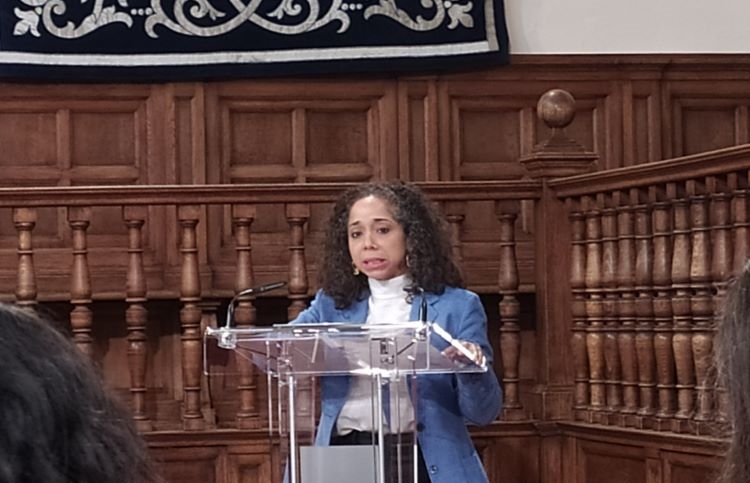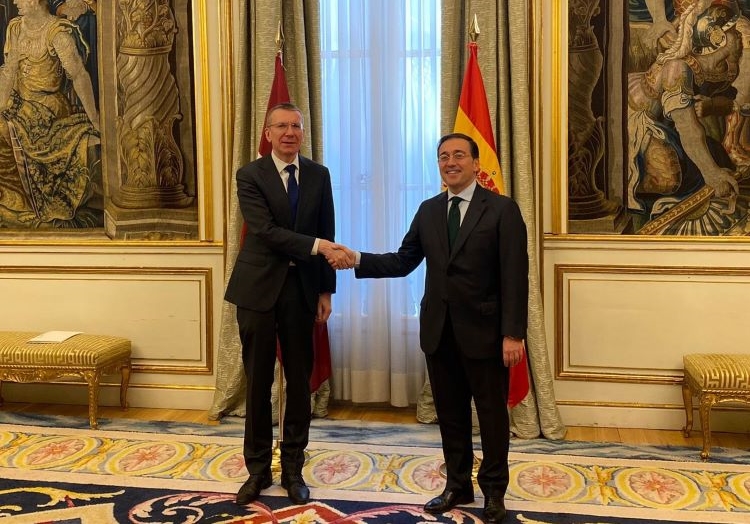Eduardo González
The U.S. Ambassador to Spain, Julissa Reynoso, warned yesterday that democracy “is under attack” around the world and affirmed, in that sense, that her country is interested in “working with Spain” in the defense of the rule of law in Ibero-America because “historical ties and language make it an essential partner” in this region.
“The data show that democracy is under attack all over the world and, of course, the most visible attack we are seeing in Ukraine at the moment,” said the ambassador during her participation in the seminar Democracy and Human Rights in Transatlantic Societies, held at the Paraninfo of the University of Alcalá Henares (Madrid) and organized by the Franklin-UAH Institute and the Vía Círculo Jefferson Association in collaboration with the U.S. Embassy, the Spain-U.S. Council Foundation, the Community of Madrid, the University Institute for Research in Latin American Studies of the University of Alcalá and the European Documentation Center of the University of Alcalá.
“Authoritarianism threatens the rules-based world order, human rights violations have multiplied and freedom of the press is at risk,” Reynoso continued. “The United States also lived through a complicated time and, despite the nation’s constant efforts to improve democracy, it is not exempt from threats, as seen on January 6 last year (with the assault on the Capitol by supporters of former President Donald Trump), which is very present in our conscience,” she continued. For this reason, she assured, Joe Biden’s Administration is “committed to fighting threats to democracy wherever they exist”.
In the case of Latin America, according to the ambassador, “democracy does not exist or has declined in several countries”, such as Venezuela, “where citizens cannot change the government peacefully through free and fair elections, there are serious restrictions on freedom of expression and violence is exercised against freedom of peaceful assembly”; in Cuba, where “citizens also cannot change their government through free and fair elections and political participation is restricted to members of a single party”; and in Nicaragua, a country that has experienced “a seriously flawed electoral process” and whose government “openly rejects democratic norms, does not respect human rights and uses violence against the opposition”.
It is also the case, more “recently,” of El Salvador, whose President Nayib Bukele “continues to undermine institutions and the democratic process, including the separation of powers,” she denounced. “I could go on and on about Latin America, where many countries violate the rights of minorities, such as indigenous and LGTBI people,” she added. For all these reasons, she assured, the United States wants to “work with Spain” because “due to its historical ties and language, Spain is an essential partner in advocating respect for democracy, the rule of law, good governance and the fight against corruption” in Ibero-America, she added.
Regarding the influence that the current international tension may have on the evolution of democracy in Latin America, the ambassador relativized the role of China, whose ties are “mainly commercial and do not affect democracy and human rights in the region, although there are exceptions, such as some countries that seek excuses to violate human rights and want non-democratic allies”.
On the other hand, the conflict generated by the Russian invasion of Ukraine could have a greater impact on the region, Reynoso estimated. “Some countries have ties with Russia that are not at all positive for the citizens of the region” and, therefore, “sanctions against President Vladimir Putin and his allies, such as Russian banks and institutions, harm or should harm some allies in Latin America, or at the very least create a pause in their activity or links with Russia,” the ambassador explained. Nicaragua, El Salvador, Cuba and Bolivia were among the 35 countries that abstained in early March from the UN General Assembly’s condemnation of the Russian invasion of Ukraine. Venezuela did not participate in that vote.







